Managing Across Boarder: Corporate Social Responsibility Report
VerifiedAdded on 2022/09/16
|8
|1708
|20
Report
AI Summary
This report provides a comprehensive overview of Corporate Social Responsibility (CSR) and its crucial role in today's business environment. It emphasizes CSR as a social construct, considering environmental, economic, and societal factors in business strategies. The report highlights the competitive advantages gained by organizations adopting CSR policies, supported by examples like Volkswagen and The Walt Disney Company. It explores the drivers pushing businesses towards CSR, including government changes, investor pressure, and consumer interest. The report also examines the benefits of CSR, such as improved public image, brand recognition, cost savings, and competitive advantages, while also addressing challenges like financial burdens, regulatory compliance, and consumer perceptions. The report concludes that CSR is essential for sustainable management and corporate success, particularly in the context of local and global development.

Running Head: REPORT 0
Managing Across Boarder
Managing Across Boarder
Paraphrase This Document
Need a fresh take? Get an instant paraphrase of this document with our AI Paraphraser
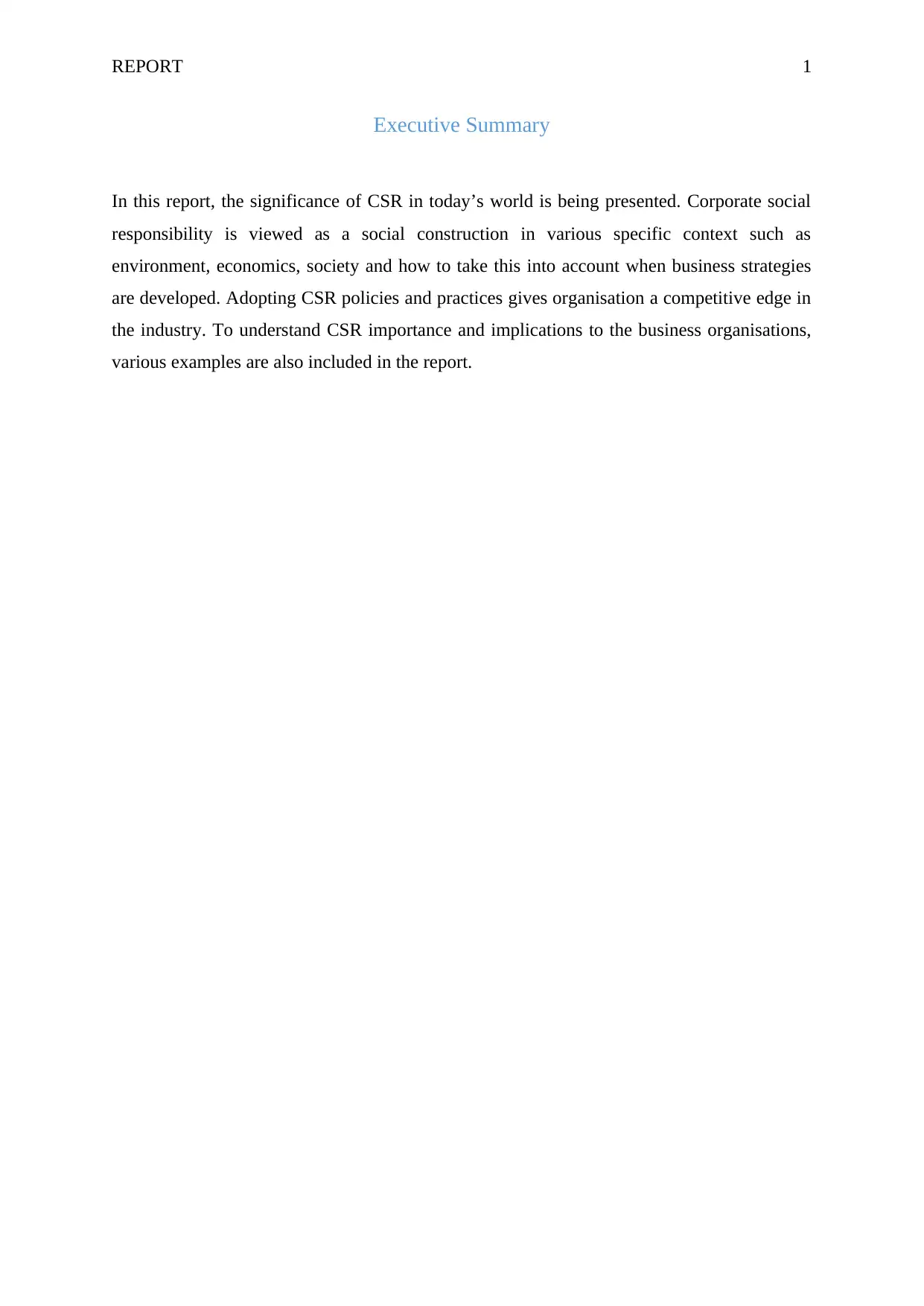
REPORT 1
Executive Summary
In this report, the significance of CSR in today’s world is being presented. Corporate social
responsibility is viewed as a social construction in various specific context such as
environment, economics, society and how to take this into account when business strategies
are developed. Adopting CSR policies and practices gives organisation a competitive edge in
the industry. To understand CSR importance and implications to the business organisations,
various examples are also included in the report.
Executive Summary
In this report, the significance of CSR in today’s world is being presented. Corporate social
responsibility is viewed as a social construction in various specific context such as
environment, economics, society and how to take this into account when business strategies
are developed. Adopting CSR policies and practices gives organisation a competitive edge in
the industry. To understand CSR importance and implications to the business organisations,
various examples are also included in the report.

REPORT 2
Contents
Introduction..............................................................................................................................2
Role of Corporate Social Responsibility in the current world.............................................3
Conclusion.................................................................................................................................6
References.................................................................................................................................7
Contents
Introduction..............................................................................................................................2
Role of Corporate Social Responsibility in the current world.............................................3
Conclusion.................................................................................................................................6
References.................................................................................................................................7
⊘ This is a preview!⊘
Do you want full access?
Subscribe today to unlock all pages.

Trusted by 1+ million students worldwide
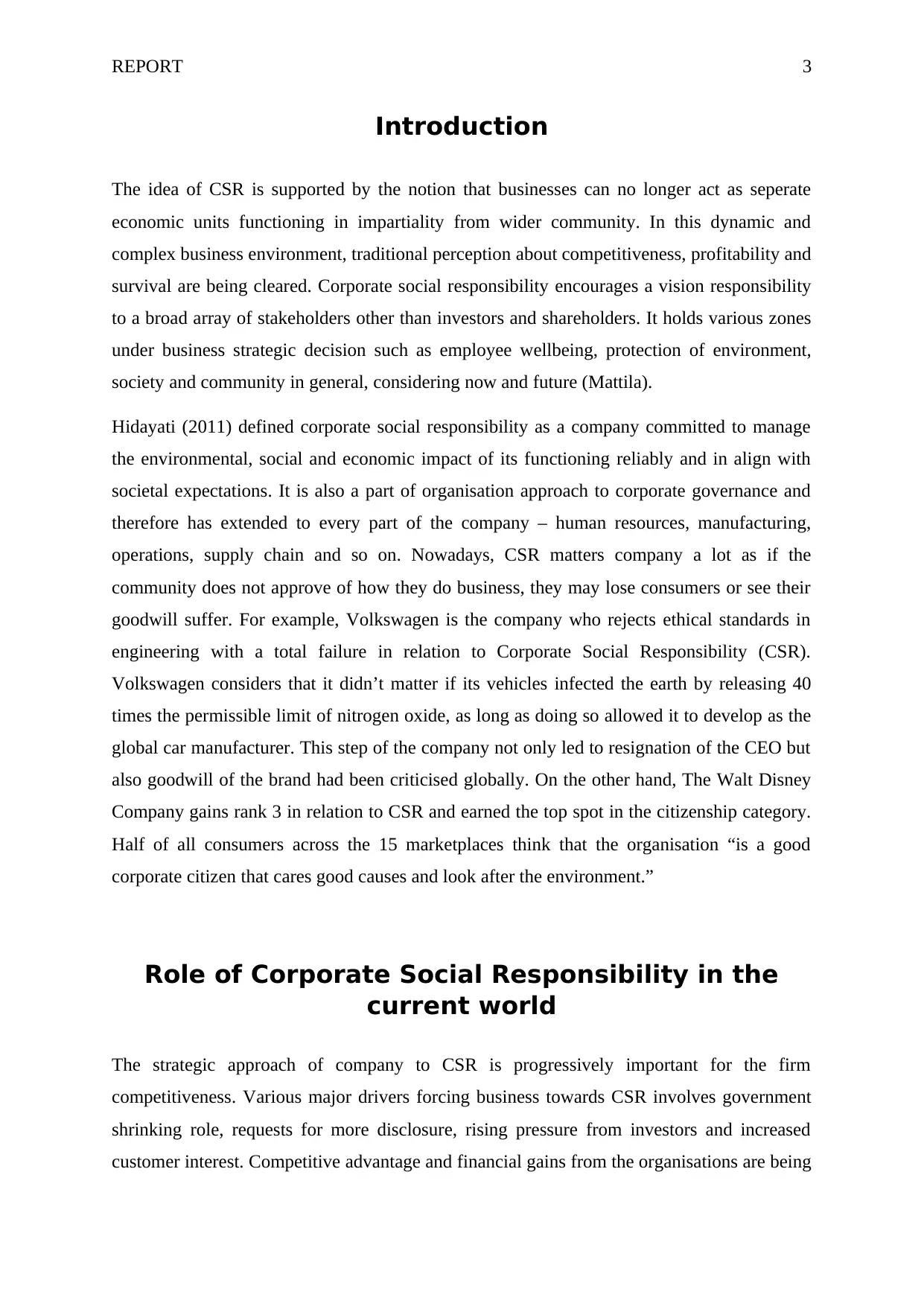
REPORT 3
Introduction
The idea of CSR is supported by the notion that businesses can no longer act as seperate
economic units functioning in impartiality from wider community. In this dynamic and
complex business environment, traditional perception about competitiveness, profitability and
survival are being cleared. Corporate social responsibility encourages a vision responsibility
to a broad array of stakeholders other than investors and shareholders. It holds various zones
under business strategic decision such as employee wellbeing, protection of environment,
society and community in general, considering now and future (Mattila).
Hidayati (2011) defined corporate social responsibility as a company committed to manage
the environmental, social and economic impact of its functioning reliably and in align with
societal expectations. It is also a part of organisation approach to corporate governance and
therefore has extended to every part of the company – human resources, manufacturing,
operations, supply chain and so on. Nowadays, CSR matters company a lot as if the
community does not approve of how they do business, they may lose consumers or see their
goodwill suffer. For example, Volkswagen is the company who rejects ethical standards in
engineering with a total failure in relation to Corporate Social Responsibility (CSR).
Volkswagen considers that it didn’t matter if its vehicles infected the earth by releasing 40
times the permissible limit of nitrogen oxide, as long as doing so allowed it to develop as the
global car manufacturer. This step of the company not only led to resignation of the CEO but
also goodwill of the brand had been criticised globally. On the other hand, The Walt Disney
Company gains rank 3 in relation to CSR and earned the top spot in the citizenship category.
Half of all consumers across the 15 marketplaces think that the organisation “is a good
corporate citizen that cares good causes and look after the environment.”
Role of Corporate Social Responsibility in the
current world
The strategic approach of company to CSR is progressively important for the firm
competitiveness. Various major drivers forcing business towards CSR involves government
shrinking role, requests for more disclosure, rising pressure from investors and increased
customer interest. Competitive advantage and financial gains from the organisations are being
Introduction
The idea of CSR is supported by the notion that businesses can no longer act as seperate
economic units functioning in impartiality from wider community. In this dynamic and
complex business environment, traditional perception about competitiveness, profitability and
survival are being cleared. Corporate social responsibility encourages a vision responsibility
to a broad array of stakeholders other than investors and shareholders. It holds various zones
under business strategic decision such as employee wellbeing, protection of environment,
society and community in general, considering now and future (Mattila).
Hidayati (2011) defined corporate social responsibility as a company committed to manage
the environmental, social and economic impact of its functioning reliably and in align with
societal expectations. It is also a part of organisation approach to corporate governance and
therefore has extended to every part of the company – human resources, manufacturing,
operations, supply chain and so on. Nowadays, CSR matters company a lot as if the
community does not approve of how they do business, they may lose consumers or see their
goodwill suffer. For example, Volkswagen is the company who rejects ethical standards in
engineering with a total failure in relation to Corporate Social Responsibility (CSR).
Volkswagen considers that it didn’t matter if its vehicles infected the earth by releasing 40
times the permissible limit of nitrogen oxide, as long as doing so allowed it to develop as the
global car manufacturer. This step of the company not only led to resignation of the CEO but
also goodwill of the brand had been criticised globally. On the other hand, The Walt Disney
Company gains rank 3 in relation to CSR and earned the top spot in the citizenship category.
Half of all consumers across the 15 marketplaces think that the organisation “is a good
corporate citizen that cares good causes and look after the environment.”
Role of Corporate Social Responsibility in the
current world
The strategic approach of company to CSR is progressively important for the firm
competitiveness. Various major drivers forcing business towards CSR involves government
shrinking role, requests for more disclosure, rising pressure from investors and increased
customer interest. Competitive advantage and financial gains from the organisations are being
Paraphrase This Document
Need a fresh take? Get an instant paraphrase of this document with our AI Paraphraser
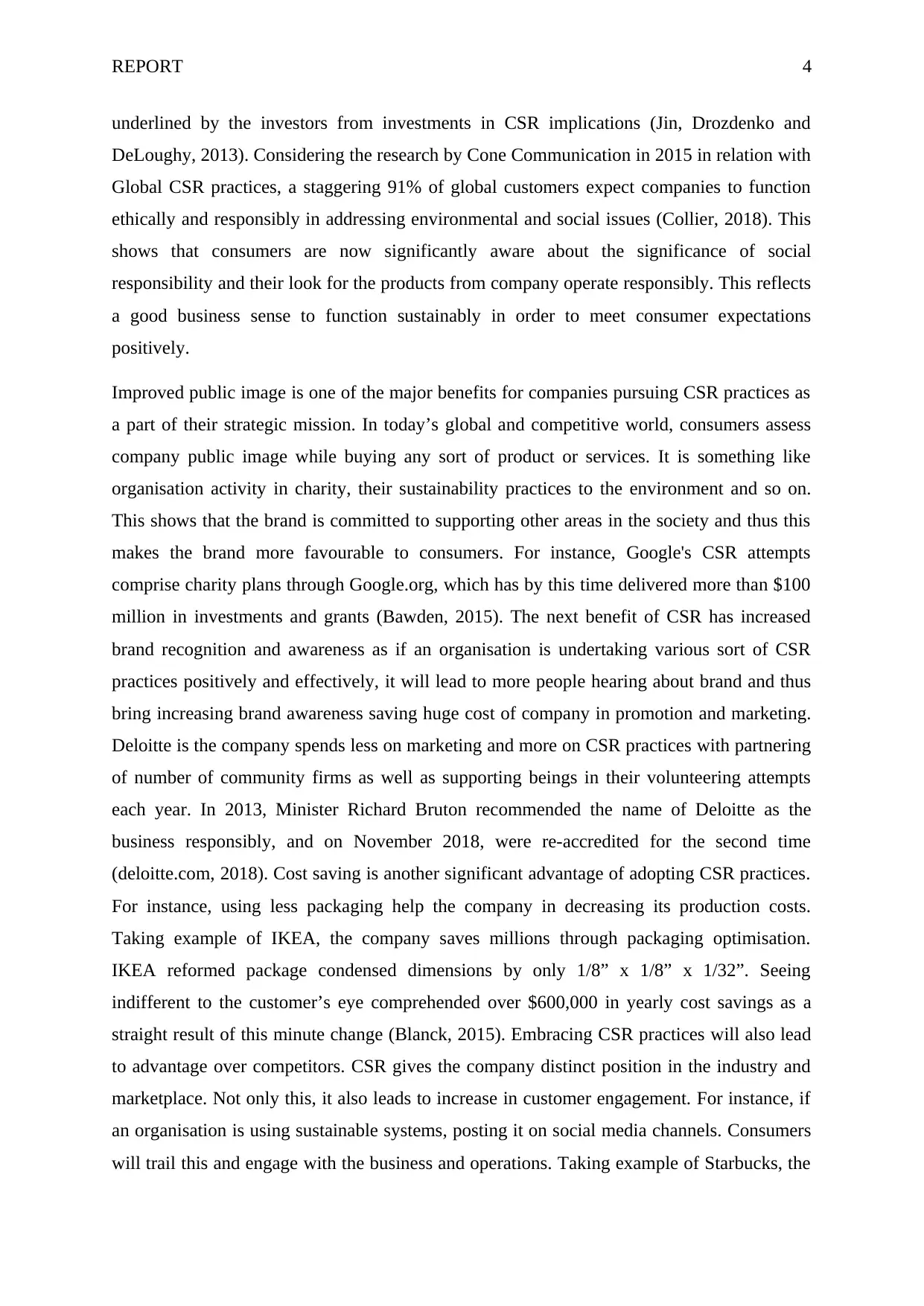
REPORT 4
underlined by the investors from investments in CSR implications (Jin, Drozdenko and
DeLoughy, 2013). Considering the research by Cone Communication in 2015 in relation with
Global CSR practices, a staggering 91% of global customers expect companies to function
ethically and responsibly in addressing environmental and social issues (Collier, 2018). This
shows that consumers are now significantly aware about the significance of social
responsibility and their look for the products from company operate responsibly. This reflects
a good business sense to function sustainably in order to meet consumer expectations
positively.
Improved public image is one of the major benefits for companies pursuing CSR practices as
a part of their strategic mission. In today’s global and competitive world, consumers assess
company public image while buying any sort of product or services. It is something like
organisation activity in charity, their sustainability practices to the environment and so on.
This shows that the brand is committed to supporting other areas in the society and thus this
makes the brand more favourable to consumers. For instance, Google's CSR attempts
comprise charity plans through Google.org, which has by this time delivered more than $100
million in investments and grants (Bawden, 2015). The next benefit of CSR has increased
brand recognition and awareness as if an organisation is undertaking various sort of CSR
practices positively and effectively, it will lead to more people hearing about brand and thus
bring increasing brand awareness saving huge cost of company in promotion and marketing.
Deloitte is the company spends less on marketing and more on CSR practices with partnering
of number of community firms as well as supporting beings in their volunteering attempts
each year. In 2013, Minister Richard Bruton recommended the name of Deloitte as the
business responsibly, and on November 2018, were re-accredited for the second time
(deloitte.com, 2018). Cost saving is another significant advantage of adopting CSR practices.
For instance, using less packaging help the company in decreasing its production costs.
Taking example of IKEA, the company saves millions through packaging optimisation.
IKEA reformed package condensed dimensions by only 1/8” x 1/8” x 1/32”. Seeing
indifferent to the customer’s eye comprehended over $600,000 in yearly cost savings as a
straight result of this minute change (Blanck, 2015). Embracing CSR practices will also lead
to advantage over competitors. CSR gives the company distinct position in the industry and
marketplace. Not only this, it also leads to increase in customer engagement. For instance, if
an organisation is using sustainable systems, posting it on social media channels. Consumers
will trail this and engage with the business and operations. Taking example of Starbucks, the
underlined by the investors from investments in CSR implications (Jin, Drozdenko and
DeLoughy, 2013). Considering the research by Cone Communication in 2015 in relation with
Global CSR practices, a staggering 91% of global customers expect companies to function
ethically and responsibly in addressing environmental and social issues (Collier, 2018). This
shows that consumers are now significantly aware about the significance of social
responsibility and their look for the products from company operate responsibly. This reflects
a good business sense to function sustainably in order to meet consumer expectations
positively.
Improved public image is one of the major benefits for companies pursuing CSR practices as
a part of their strategic mission. In today’s global and competitive world, consumers assess
company public image while buying any sort of product or services. It is something like
organisation activity in charity, their sustainability practices to the environment and so on.
This shows that the brand is committed to supporting other areas in the society and thus this
makes the brand more favourable to consumers. For instance, Google's CSR attempts
comprise charity plans through Google.org, which has by this time delivered more than $100
million in investments and grants (Bawden, 2015). The next benefit of CSR has increased
brand recognition and awareness as if an organisation is undertaking various sort of CSR
practices positively and effectively, it will lead to more people hearing about brand and thus
bring increasing brand awareness saving huge cost of company in promotion and marketing.
Deloitte is the company spends less on marketing and more on CSR practices with partnering
of number of community firms as well as supporting beings in their volunteering attempts
each year. In 2013, Minister Richard Bruton recommended the name of Deloitte as the
business responsibly, and on November 2018, were re-accredited for the second time
(deloitte.com, 2018). Cost saving is another significant advantage of adopting CSR practices.
For instance, using less packaging help the company in decreasing its production costs.
Taking example of IKEA, the company saves millions through packaging optimisation.
IKEA reformed package condensed dimensions by only 1/8” x 1/8” x 1/32”. Seeing
indifferent to the customer’s eye comprehended over $600,000 in yearly cost savings as a
straight result of this minute change (Blanck, 2015). Embracing CSR practices will also lead
to advantage over competitors. CSR gives the company distinct position in the industry and
marketplace. Not only this, it also leads to increase in customer engagement. For instance, if
an organisation is using sustainable systems, posting it on social media channels. Consumers
will trail this and engage with the business and operations. Taking example of Starbucks, the
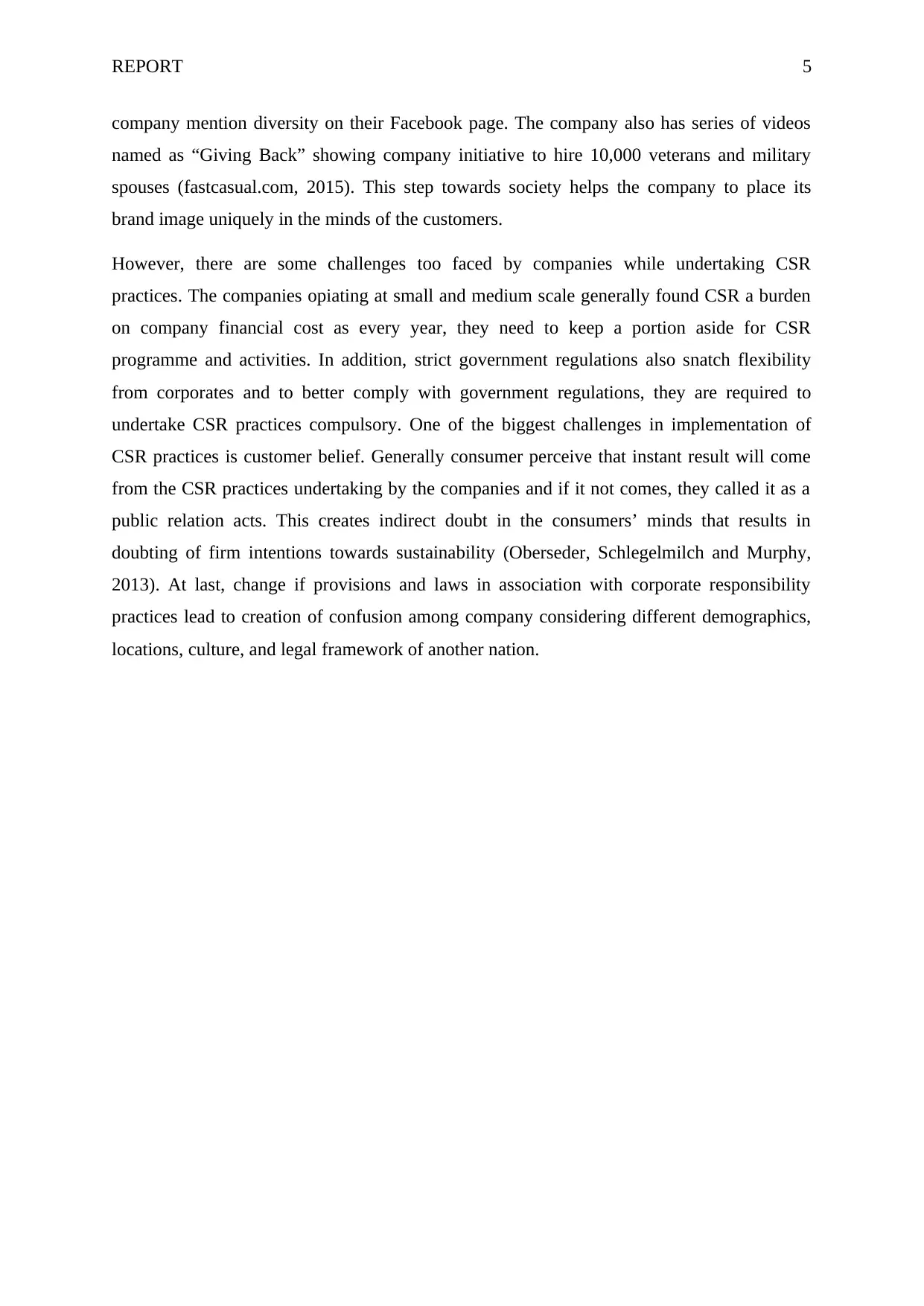
REPORT 5
company mention diversity on their Facebook page. The company also has series of videos
named as “Giving Back” showing company initiative to hire 10,000 veterans and military
spouses (fastcasual.com, 2015). This step towards society helps the company to place its
brand image uniquely in the minds of the customers.
However, there are some challenges too faced by companies while undertaking CSR
practices. The companies opiating at small and medium scale generally found CSR a burden
on company financial cost as every year, they need to keep a portion aside for CSR
programme and activities. In addition, strict government regulations also snatch flexibility
from corporates and to better comply with government regulations, they are required to
undertake CSR practices compulsory. One of the biggest challenges in implementation of
CSR practices is customer belief. Generally consumer perceive that instant result will come
from the CSR practices undertaking by the companies and if it not comes, they called it as a
public relation acts. This creates indirect doubt in the consumers’ minds that results in
doubting of firm intentions towards sustainability (Oberseder, Schlegelmilch and Murphy,
2013). At last, change if provisions and laws in association with corporate responsibility
practices lead to creation of confusion among company considering different demographics,
locations, culture, and legal framework of another nation.
company mention diversity on their Facebook page. The company also has series of videos
named as “Giving Back” showing company initiative to hire 10,000 veterans and military
spouses (fastcasual.com, 2015). This step towards society helps the company to place its
brand image uniquely in the minds of the customers.
However, there are some challenges too faced by companies while undertaking CSR
practices. The companies opiating at small and medium scale generally found CSR a burden
on company financial cost as every year, they need to keep a portion aside for CSR
programme and activities. In addition, strict government regulations also snatch flexibility
from corporates and to better comply with government regulations, they are required to
undertake CSR practices compulsory. One of the biggest challenges in implementation of
CSR practices is customer belief. Generally consumer perceive that instant result will come
from the CSR practices undertaking by the companies and if it not comes, they called it as a
public relation acts. This creates indirect doubt in the consumers’ minds that results in
doubting of firm intentions towards sustainability (Oberseder, Schlegelmilch and Murphy,
2013). At last, change if provisions and laws in association with corporate responsibility
practices lead to creation of confusion among company considering different demographics,
locations, culture, and legal framework of another nation.
⊘ This is a preview!⊘
Do you want full access?
Subscribe today to unlock all pages.

Trusted by 1+ million students worldwide
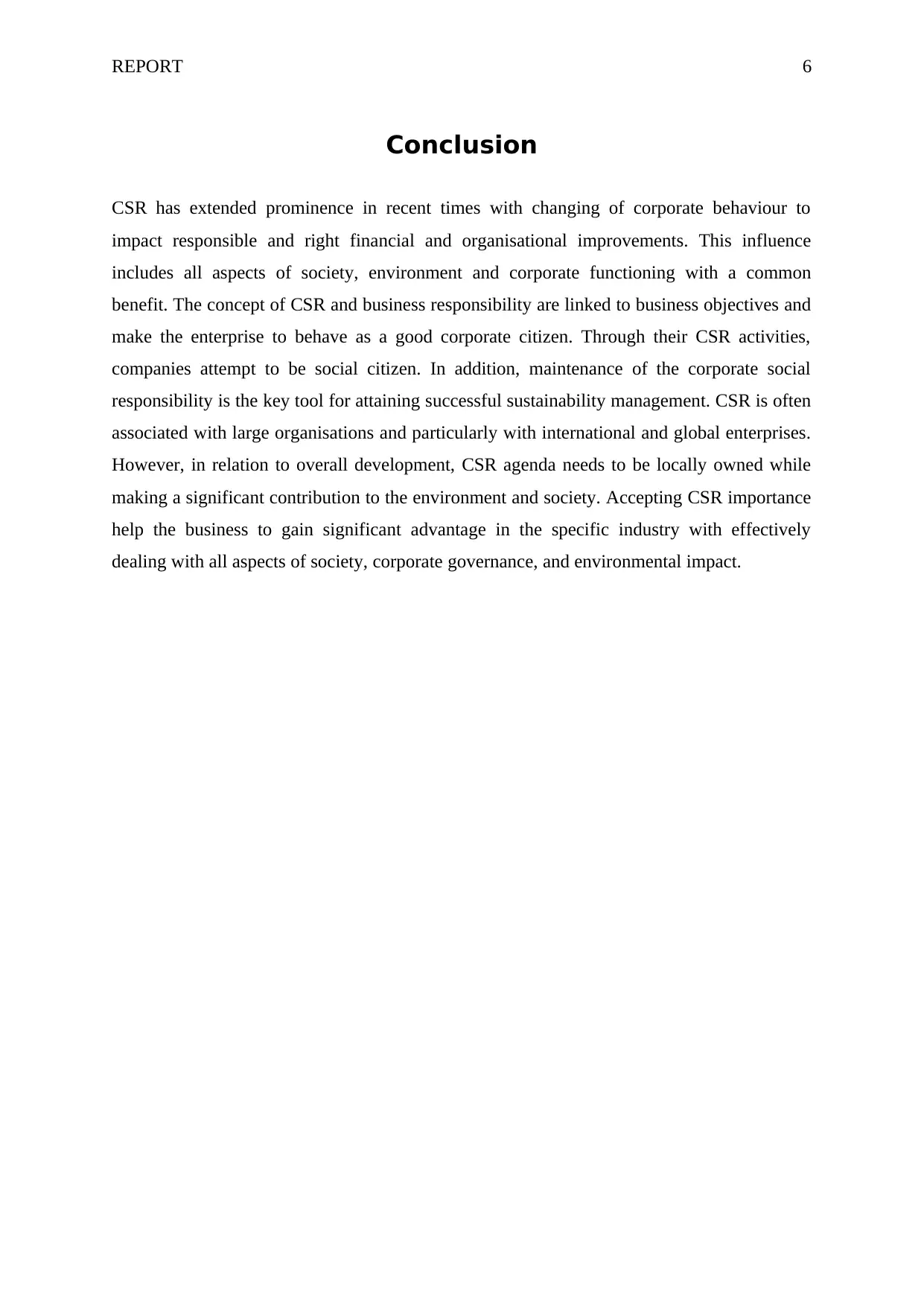
REPORT 6
Conclusion
CSR has extended prominence in recent times with changing of corporate behaviour to
impact responsible and right financial and organisational improvements. This influence
includes all aspects of society, environment and corporate functioning with a common
benefit. The concept of CSR and business responsibility are linked to business objectives and
make the enterprise to behave as a good corporate citizen. Through their CSR activities,
companies attempt to be social citizen. In addition, maintenance of the corporate social
responsibility is the key tool for attaining successful sustainability management. CSR is often
associated with large organisations and particularly with international and global enterprises.
However, in relation to overall development, CSR agenda needs to be locally owned while
making a significant contribution to the environment and society. Accepting CSR importance
help the business to gain significant advantage in the specific industry with effectively
dealing with all aspects of society, corporate governance, and environmental impact.
Conclusion
CSR has extended prominence in recent times with changing of corporate behaviour to
impact responsible and right financial and organisational improvements. This influence
includes all aspects of society, environment and corporate functioning with a common
benefit. The concept of CSR and business responsibility are linked to business objectives and
make the enterprise to behave as a good corporate citizen. Through their CSR activities,
companies attempt to be social citizen. In addition, maintenance of the corporate social
responsibility is the key tool for attaining successful sustainability management. CSR is often
associated with large organisations and particularly with international and global enterprises.
However, in relation to overall development, CSR agenda needs to be locally owned while
making a significant contribution to the environment and society. Accepting CSR importance
help the business to gain significant advantage in the specific industry with effectively
dealing with all aspects of society, corporate governance, and environmental impact.
Paraphrase This Document
Need a fresh take? Get an instant paraphrase of this document with our AI Paraphraser
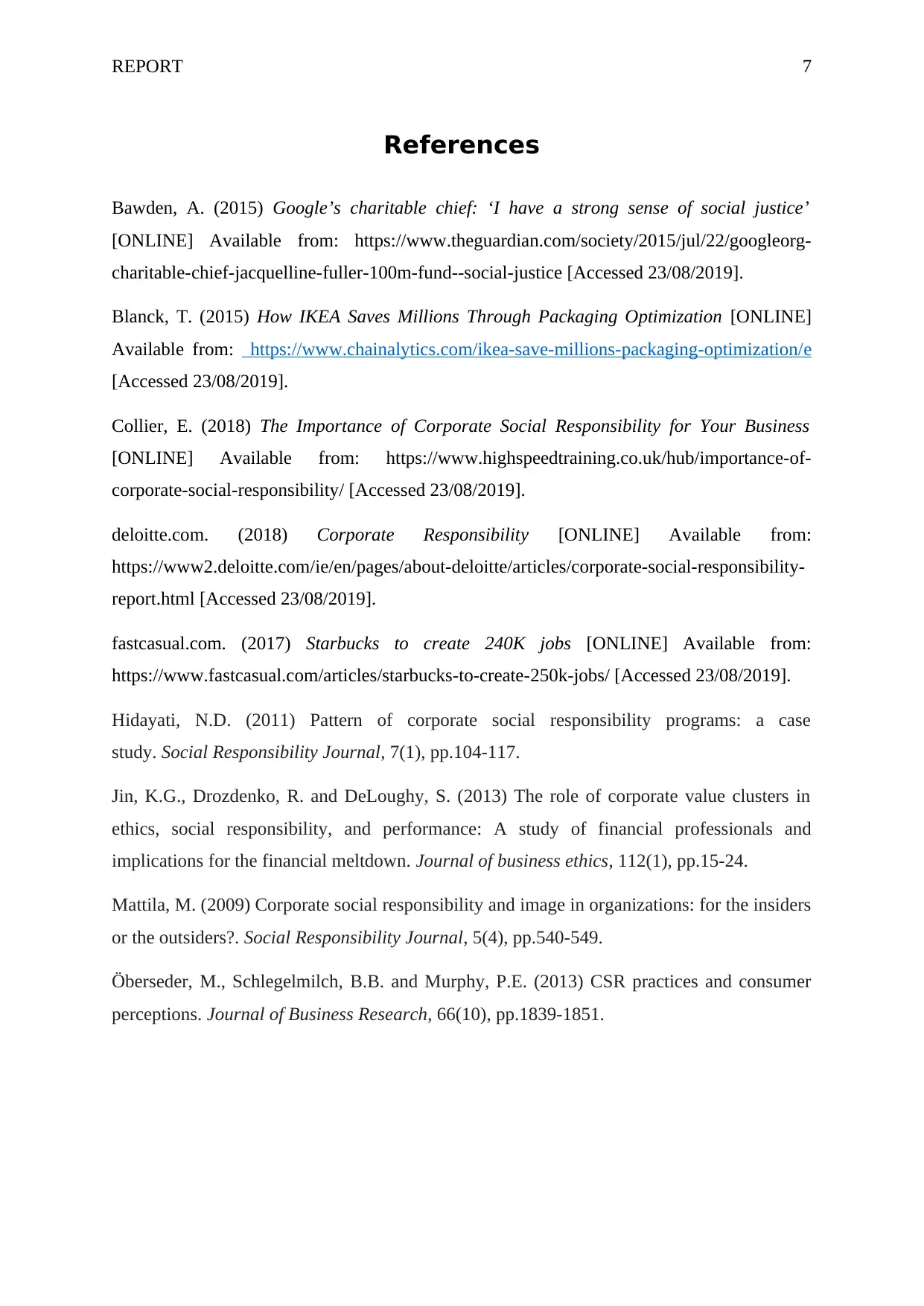
REPORT 7
References
Bawden, A. (2015) Google’s charitable chief: ‘I have a strong sense of social justice’
[ONLINE] Available from: https://www.theguardian.com/society/2015/jul/22/googleorg-
charitable-chief-jacquelline-fuller-100m-fund--social-justice [Accessed 23/08/2019].
Blanck, T. (2015) How IKEA Saves Millions Through Packaging Optimization [ONLINE]
Available from: https://www.chainalytics.com/ikea-save-millions-packaging-optimization/e
[Accessed 23/08/2019].
Collier, E. (2018) The Importance of Corporate Social Responsibility for Your Business
[ONLINE] Available from: https://www.highspeedtraining.co.uk/hub/importance-of-
corporate-social-responsibility/ [Accessed 23/08/2019].
deloitte.com. (2018) Corporate Responsibility [ONLINE] Available from:
https://www2.deloitte.com/ie/en/pages/about-deloitte/articles/corporate-social-responsibility-
report.html [Accessed 23/08/2019].
fastcasual.com. (2017) Starbucks to create 240K jobs [ONLINE] Available from:
https://www.fastcasual.com/articles/starbucks-to-create-250k-jobs/ [Accessed 23/08/2019].
Hidayati, N.D. (2011) Pattern of corporate social responsibility programs: a case
study. Social Responsibility Journal, 7(1), pp.104-117.
Jin, K.G., Drozdenko, R. and DeLoughy, S. (2013) The role of corporate value clusters in
ethics, social responsibility, and performance: A study of financial professionals and
implications for the financial meltdown. Journal of business ethics, 112(1), pp.15-24.
Mattila, M. (2009) Corporate social responsibility and image in organizations: for the insiders
or the outsiders?. Social Responsibility Journal, 5(4), pp.540-549.
Öberseder, M., Schlegelmilch, B.B. and Murphy, P.E. (2013) CSR practices and consumer
perceptions. Journal of Business Research, 66(10), pp.1839-1851.
References
Bawden, A. (2015) Google’s charitable chief: ‘I have a strong sense of social justice’
[ONLINE] Available from: https://www.theguardian.com/society/2015/jul/22/googleorg-
charitable-chief-jacquelline-fuller-100m-fund--social-justice [Accessed 23/08/2019].
Blanck, T. (2015) How IKEA Saves Millions Through Packaging Optimization [ONLINE]
Available from: https://www.chainalytics.com/ikea-save-millions-packaging-optimization/e
[Accessed 23/08/2019].
Collier, E. (2018) The Importance of Corporate Social Responsibility for Your Business
[ONLINE] Available from: https://www.highspeedtraining.co.uk/hub/importance-of-
corporate-social-responsibility/ [Accessed 23/08/2019].
deloitte.com. (2018) Corporate Responsibility [ONLINE] Available from:
https://www2.deloitte.com/ie/en/pages/about-deloitte/articles/corporate-social-responsibility-
report.html [Accessed 23/08/2019].
fastcasual.com. (2017) Starbucks to create 240K jobs [ONLINE] Available from:
https://www.fastcasual.com/articles/starbucks-to-create-250k-jobs/ [Accessed 23/08/2019].
Hidayati, N.D. (2011) Pattern of corporate social responsibility programs: a case
study. Social Responsibility Journal, 7(1), pp.104-117.
Jin, K.G., Drozdenko, R. and DeLoughy, S. (2013) The role of corporate value clusters in
ethics, social responsibility, and performance: A study of financial professionals and
implications for the financial meltdown. Journal of business ethics, 112(1), pp.15-24.
Mattila, M. (2009) Corporate social responsibility and image in organizations: for the insiders
or the outsiders?. Social Responsibility Journal, 5(4), pp.540-549.
Öberseder, M., Schlegelmilch, B.B. and Murphy, P.E. (2013) CSR practices and consumer
perceptions. Journal of Business Research, 66(10), pp.1839-1851.
1 out of 8
Related Documents
Your All-in-One AI-Powered Toolkit for Academic Success.
+13062052269
info@desklib.com
Available 24*7 on WhatsApp / Email
![[object Object]](/_next/static/media/star-bottom.7253800d.svg)
Unlock your academic potential
Copyright © 2020–2026 A2Z Services. All Rights Reserved. Developed and managed by ZUCOL.





